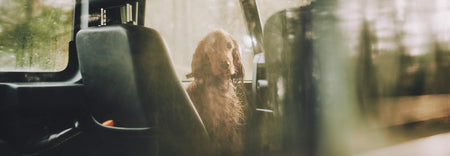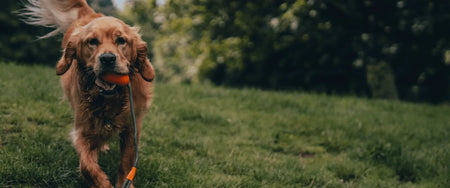By Alec Lom
The UK economy is said to be undergoing a ‘Green Revolution’ and efforts are continuing on the international scene, too, to increase our awareness of the environment and issues such as sustainability.
So, how can Britain’s 10 million dog owners do their bit?
Here at Beco, we’d like to encourage everyone, especially the ‘pet parents’ among us, to increase their efforts towards protecting the environment and to help us grow the UK’s £40bn ‘green’ economy.
We’ve published our new ‘5-Step Green Guide’ to offer some support and guidance to dog owners so we can all help safeguard the environment as we emerge from the Coronavirus pandemic.
During the pandemic and lockdowns, our air quality has improved, pollution has eased, public appreciation of nature and green spaces has grown – but it’s important to remember that threats from global warming and plastic pollution in our oceans remain.
We say: “It’s time to care for our planet as much as our dogs”. Following these 5 simple steps may help:
Step 1: ‘Wage war on plastic waste’
Every year, 8 million tons of plastic end up in our oceans, with drastic effects on marine life. Our latest stats reveal that last year Beco’s worldwide dog-toy sales used recycled, shredded plastic from 1.7 million plastic bottles that might otherwise have ended up in our oceans and it’s urging consumers to cut down on single-use plastic as much as possible. Which is part of the reason that we are seeing a rise in in plastic free shops and initiatives.
Step 2: ‘Care about poop’
British dogs produce over 1,000 tonnes of poop every day, causing owners, local councils and parks major disposal challenges. The bestselling dog poop bags Beco produce are made using 100% recycled plastic, to reuse what's already here. Since 2012, Beco poop bags have helped owners in 50 countries behave responsibly by scooping 463 million poops while minimising their environmental impact. Beco asks British dog owners to follow suit and dispose of poop responsibly.
Step 3: ‘Investigate ingredients’
Humans care about food sourcing and quality ingredients for family meals, and Beco believes dogs deserve the same. Beco’s dry dog food contains only certified ethical and sustainable ingredients that support the environment, eg, Marine Stewardship Council-certified haddock, and free-range chicken from Norfolk. Focusing on food provenance, Beco has adopted a different approach from many other producers and is now urging more conscientious dog owners to consider sustainability and the environment when making healthy food choices for their pet.
Step 4: ‘Enjoy more exercise’
While observing social distancing, walking daily with your dog helps them stay fit and healthy and also boosts your own mental and physical wellbeing after lockdown. As we emerge from Coronavirus restrictions, Beco will be stepping up its encouragement to owners to increase the amount of exercise they take outdoors with their dogs.
Step 5: ‘Prioritise packaging’
The UK alone produces more than 170m tonnes of waste a year, much of it food packaging. Supermarkets using excess packaging are facing a backlash from consumers who increasingly favour zero-waste shops. Beco makes its packaging out of materials such as recycled cardboard and PLA, a biodegradable plastic from plant-based renewables. Beco urges discerning consumers to prioritise environmentally friendly packaging as they carry on caring about the planet, and hopes fellow manufacturers also take note.

‘Less damage to the ocean’
Beco Founder George Bramble says: "We’ve devoted the past 10 years to creating the most sustainable products known to dogs. Now, there are many growing existential threats to our environment, it's time to care for our planet just as much as we do our dogs.
“In the past year, we sold Beco sustainable dog toys made from around 1.1 million upcycled plastic bottles. That’s 1.1 million items of plastic litter recycled, not heading for our oceans, not poisoning marine life. We're doing this because we really care about the environment and we want to pioneer the way.
“Since 2009, we’ve been pushing plastic-alternative pet products made from bamboo. At first, people just didn’t appreciate why a non-plastic pet bowl was the better option. Now things have changed.
“Since Sir David Attenborough’s influential documentary series ‘Blue Planet II’ aired in 2017 highlighting the extreme issues of plastic in our oceans, consumer sentiment has changed. We see the past few years as “pre-” and “post-Attenborough”.
During the last decade, Beco and its products have won, or been shortlisted for, an impressive haul of no fewer than 14 awards for its product ranges. These include its dog food, poop bags and dog toys and accessories, which are made from 100% natural rubber and recycled plastic.
Beco has frequently appeared in the media, including in The Times, The Daily Telegraph, Vogue magazine, the Mail on Sunday and on BBC Television's hit ‘The Apprentice’ series, hosted by Lord Alan Sugar.
‘Borrow from nature, also give back’
George adds: "This next chapter in Beco’s journey is, for us, both challenging and exciting. As we leave Covid-19 lockdown, we’re keen to encourage dog walking which can enhance your physical and mental wellbeing. But the ongoing threats to our environment go wider.
“As a company, we feel a commitment to the planet and our customers to create the best products we can, whilst striving to be as sustainable as possible. From products to process, our team has worked incredibly hard to make everything the best it can possibly be.
“As a business we’re not perfect, but our materials and ingredients reflect who we are, whether that be the wild-caught fish that goes into our dog food, the hypoallergenic BPA-free bamboo that goes into our bowls or the natural rubber that makes up our toy balls.
“We are striving to create the most sustainable pet products possible. By using recycled & renewable materials, we try to ensure that what we borrow from nature, we also give back.”









